Orthodox Ressourcement: Demetrios Koutroubis and the Renewal of Theology in Modern Greece
- Tikhon Pino

- Nov 27, 2024
- 4 min read
"The theology in our country is now divided into the period before Demetrios Koutroubis and the period after him."
-Christos Yannaras

Demetrios Koutroubis (1921–83) was described by Christos Yannaras as one of the greatest theologians of the modern era. A contemporary lay elder and a kind of latter-day Socrates, his disciples and students are better known than the man himself: Archbishop Anastasios of Albania, Archbishop Demetrios of America, Archimandrite Vasileios of Stavronikita (famed for his Hymn of Entry), the theologian Demetrios Mavropoulos, and, not least, Christos Yannaras.

Yannaras remarked of Koutroubis that "he was like some extraordinary messenger who slipped in among us without fuss, fulfilled his mission discreetly, and left almost unnoticed. Perhaps I have this sense because he never claimed anything -- not even his own bread -- he never argued with anyone, he was never ambitious for anything. He came and went so fleetingly simply ... to open some people's eyes, and to leave us with the shock of an unprecedented ethos. And with these few things he made an indelible impression on the life of Greece -- theology in our country is now divided into the period before Demetrios Koutroubis and the period after him."[1]
A figure who lived through the Second World War, Koutroubis is associated especially with the "theology of the 1960s," a time of intense theological renewal and ressourcement in Orthodox Greece. According to Yannaras, it was through Koutroubis that the name and writings of St Gregory Palamas were first heard in Greece.[2] This was a time when Orthodox theologians and students were returning to the sources, returning to the Fathers, and leaving behind the Manual theology of their forebears in the academy. They were hearing for the first time not only the name of St Gregory Palamas, but also the name of St Symeon the New Theologian and other mystical writers of the Orthodox tradition. And it was Koutroubis who instrumental, quietly and subtly, in animating this broad revival.
Koutroubis was above all a mentor and a guide, meeting privately and socially, in the context of his great poverty and dispossession, with an informal circle of disciples. He instilled in them a love for the very sources of theological inspiration that Orthodox Christians take for granted today, but which were by no means normative a century ago: the liturgy and worship of the Church, the mystical theology of the saints, and the inspired and charismatic preaching of the Fathers.

Koutroubis owed much of his inspiration to the ressourcement movement that had unfolded in the decades prior in the West, where he had spent considerable time. Much like the celebrated Athonite Maksim Grek, or Maximos the Greek (1475-1556), the young Demetrios had been awakened to the treasures of the Orthodox spiritual heritage through a positive encounter with Roman Catholicism. A young man in search of authenticity, devotion, and truth, Demetrios was drawn to the vibrancy and depth of the Latin Church through his experiences, while sick in hospital, with educated and earnest Catholic chaplains. He would eventually convert to Roman Catholicism, where he joined the Jesuits, who provided him with a substantive education and the opportunity to live and teach in Western Europe.
In Europe, Koutroubis encountered not only the ressourcement of pre-Vatican II Catholicism, and the richness of the ancient Latin tradition, but also the groundbreaking developments taking place in the Russian diaspora. It was in France in the post-War period that Koutroubis would rediscover the Orthodox faith of his fathers, and like the young Michael Trivolis (St Maksim Grek) realize that the patristic tradition to which he was initially drawn within Roman Catholicism was the tradition of the Orthodox Church.
Koutroubis was received back into the Orthodox Church in 1956, by none other than Fr John Romanides, at the same Divine Liturgy in which Philip Sherrard received his first Communion. He did not, however, abandon his affection for the Western tradition. Koutroubis had a particular devotion to Our Lady of Walsingham, whose shrine in England includes an Orthodox chapel and chaplaincy. Koutroubis would spend the last days of his life there in 1983. He lies buried in England to this day as a kind of bridge between East and West.
Substantive information about Koutroubis can be difficult to find, even in Greece. Yet we are now blessed to have access, in English, to a volume dedicated to his legacy, The Master Builder: Demetrios Koutroubis and the Renewal of Theology in Modern Greece (Evia, 2024).[3]
On Thursday, October 24, 2024, we were joined on the campus of Holy Cross Greek Orthodox School of Theology by the author, Dr Marcus Plested (Marquette University), who spoke about his new book and the underappreciated legacy of Koutroubis in both the Greek and anglophone worlds.

The book is divided into three major sections, preceded by an Introduction. The first is a pair of studies on Koutroubis, one by Plested and the other by Demetrios Mavropoulos. The second is a series of Recollections and Reflections, one excerpted from the Refuge of Ideas by Christos Yannaras and the rest by English friends of Koutroubis, including Fr Philip Steer, the longtime Orthodox chaplain at the Shrine of Our Lady of Walsingham. The third section includes the first-ever English translation of three short works by Koutroubis, giving readers a taste of his subtle genius and vision.

The Pappas Patristic Institute is grateful to Dr Plested for coming to speak to us about his new book. Faculty and students enjoyed an edifying and informative conversation about an underappreciated yet important figure of modern Orthodox theology. It can only be hoped that more people will discover this interesting chapter in the history of Greece and of the whole Church.
[1] From his Refuge of Ideas, translated in The Master Builder, p. 79.
[2] Ibid., 73.
[3] The book is published by Denise Harvey (Publisher), known especially for Wounded by Love: The Life and Wisdom of Elder Porphyrios.










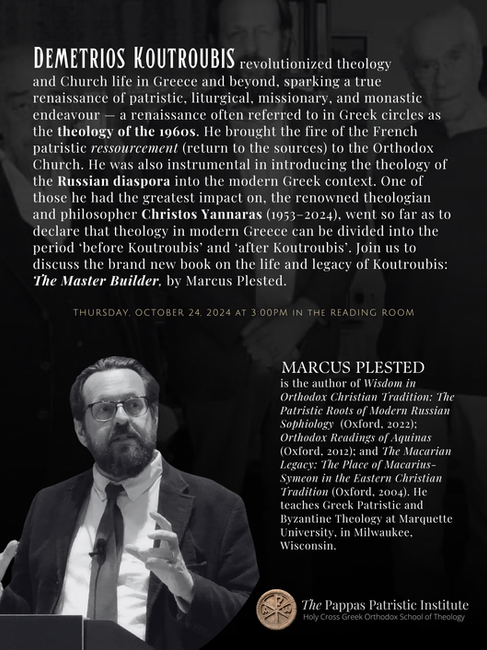
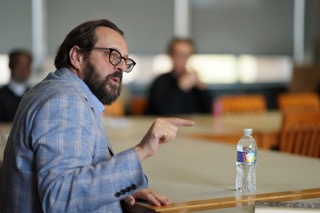







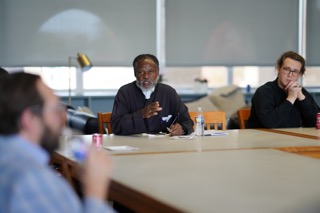
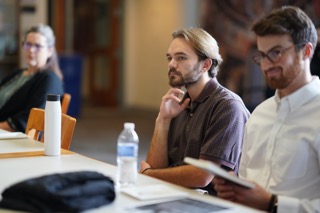
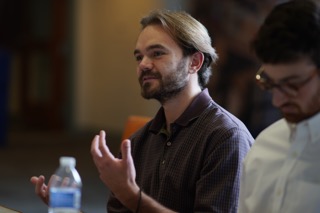

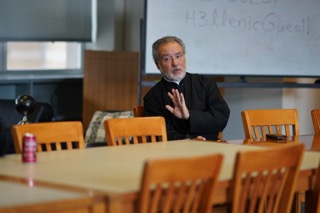
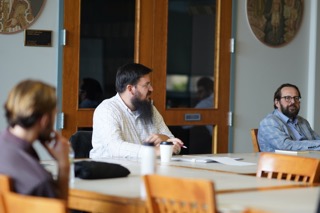


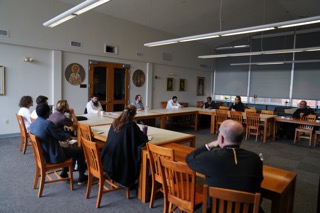
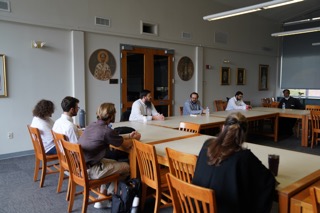
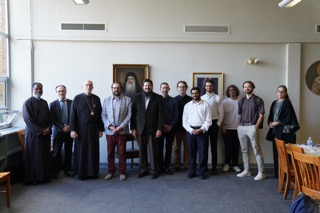
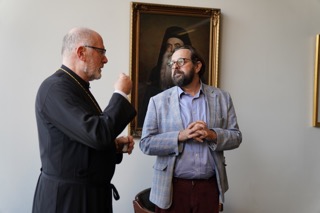




Comments